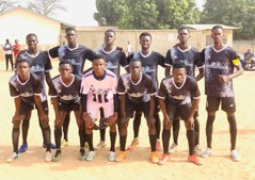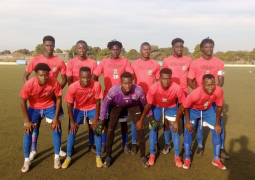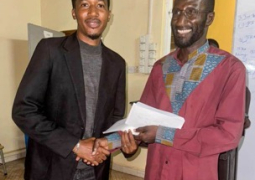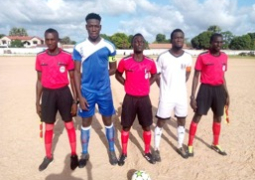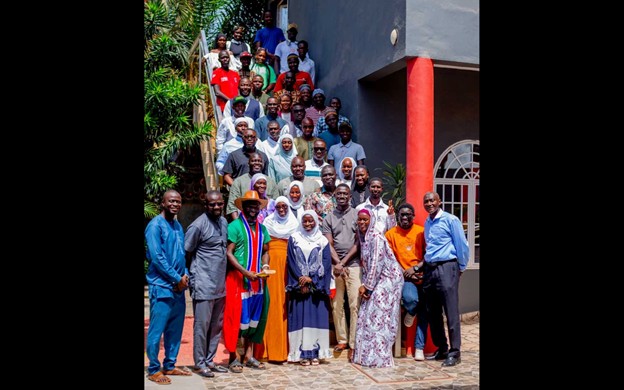
The Sports Journalists’ Association of The Gambia (SJAG) gathered over 50 members, veteran reporters, eager students and sports administrators to mark International Sports Journalists Day, commemorating the 1924 founding of the International Sports Press Association (AIPS) at the Paris Olympics.
Under the theme “Evolution of Sports Press in The Gambia: Challenges and Opportunities,” the event was more than a celebration, it was a rallying cry for journalists who weave the nation’s sporting tapestry, from Banjul’s gritty streets to the global stage of international competitions.
Held at the Seaview Hotel conference room, the commemoration bridged the past and future of Gambian sports journalism.
From Tijan Masanneh Ceesay’s nostalgic tales of radio broadcasts to the digital dreams of young reporters, the day pulsed with a shared mission: to tell stories that inspire, hold power accountable, and elevate The Gambia’s sporting soul.
A Legacy Born in Banjul
Veteran journalist Tijan Masanneh Ceesay, his voice rich with history, addressed the crowd, eyes gleaming with memories.
“I became known in The Gambia at age fourteen when I called my first game over Radio Gambia in 1977.
However, before that, around age twelve, I was submitting sports stories to The Gambia Outlook newspaper; sports journalism became a passion because I became a sports junkie at a very early age given my proximity to Real De Banjul,” he said.
His journey began in the 1970s, when The Gambia News Bulletin, published thrice weekly, and the weekly Senegambia Sun, launched in 1982, were the only sports outlets.
Ceesay’s path, from sports editor of Sunu Kibaroto managing editor of The Cabral Daily, e Two’s first daily football newspaper, reflected an era of scarce resources but boundless passion.
Honouring pioneers, Ceesay’s tone softened with reverence.
“With much humility, we are gathered here today as an Association because all those before us in this profession; the Saul Njie’s, Pap Saine, Bora Mboge, Peter Gomez, Remi Joiner, Seedy Jammeh, Sandige Njie and those that have preceded us, Dupeh Joiner, Silas Maclean Jones and Malick Alaba Jones (May they rest in peace) all of whom in one way or another, laid the foundation for this day.” His message to younger journalists was direct: “People may underestimate you, but without you people (sports journalists), there is no sports in the Gambia.”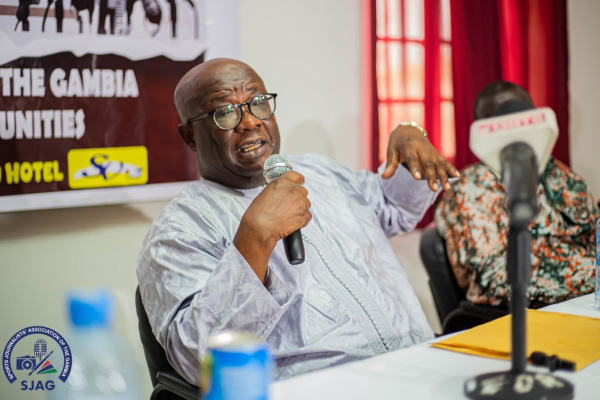
Tijan Masanneh Ceesay (Photo by SJAG)
A New Era of Storytelling
Masterfully orchestrated by former journalist Dodou Bojang, the event crackled with urgency.
SJAG President Omar Jarju took the stage, his keynote brimming with conviction. “As we continue to navigate through unprecedented times, our role as sports journalists has never been more crucial. We have the responsibility to provide accurate and unbiased information to the public, to hold those in power accountable and to give a voice to those who may not have one,” he declared.
Addressing artificial intelligence, he warned of its double-edged sword: “Advancing technology has brought AI into sports journalism, offering benefits like faster data analysis but raising concerns about our profession’s future. As SJAG, we must balance AI’s use with preserving our craft’s integrity. Human storytelling remains vital, and we should harness AI to enhance, not replace, our work.”
Students from the University of The Gambia’s School of Journalism and the Media Academy for Journalism and Communications as well as SJAG members leaned in, Jarju’s words a call to action.
Their pens and microphones, they realized, carry the weight of a nation’s dreams.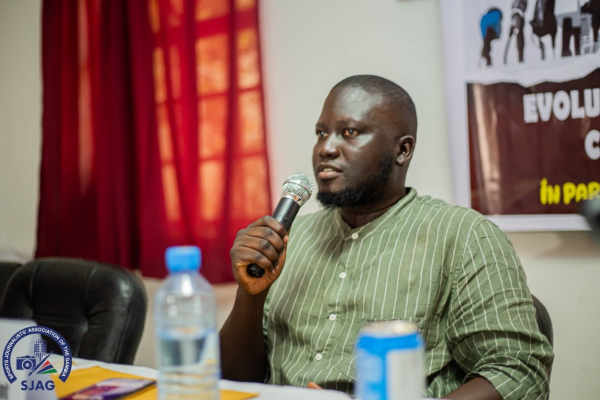
SJAG President Omar Jarju (Photo by SJAG)
Rising to the Challenge
The Gambia’s sports scene is soaring.
The rise of domestic leagues like the Gambia Football Federation’s First Division and volleyball, coupled with Gambian athletes’ growing presence in international competitions, has thrust journalists into the spotlight. Yet challenges persist: outdated equipment, limited event access, and a digital age where speed often trumps accuracy. Kajali Sonko, Deputy Permanent Secretary representing the Minister of Information, Dr. Ismaila Ceesay, offered support.
“The sports press in The Gambia has undergone remarkable transformation, from basic newspaper match reports in the 1980s to today’s vibrant multimedia coverage across radio, television and digital platforms,” he said.
“Our journalists now bring live action, in-depth analysis and athlete stories to audiences nationwide and in the Diaspora.”
“This evolution mirrors The Gambia’s growing sports excellence, from our historic AFCON qualification to grassroots talent development.”
Sonko’s pledge to implement a recent MOU, establish a Sports Media Development Fund and create media-sports collaboration forums drew applause, promising to bridge the gap between ambition and reality.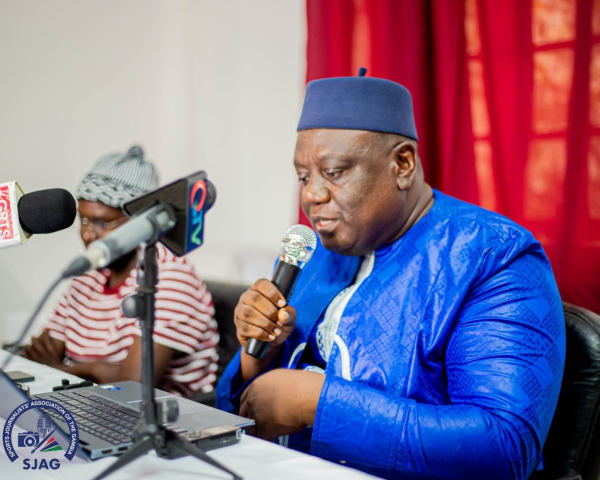
Kajali Sonko, Deputy Permanent Secretary (Photo by SJAG)
Navigating the Digital Frontier
In an era of tweets, analytics, and deep fakes, communications specialist Famara Fofana urged vigilance. “When fake news surrounding players and clubs are being peddled online, remember that it is you the journalists that we look forward to salvation. Therefore, you people cannot afford to get it wrong. You must be wary of the pitfalls of sensationalism and the pressure to prioritise speed over accuracy. Verification, fact-checking are non-negotiables. Before you share or repost, please establish the factuality of a given write-up, video or image. This is not just the age of social media and analytics, but also the age of deep fakes,” he said. His words struck a chord with journalists navigating social media’s power to amplify reach and muddy truth.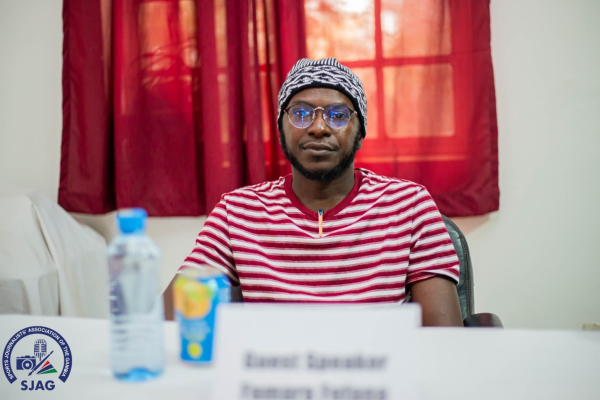
Famara Fofana (Photo by SJAG)
A Collective Mission
The day wove together diverse voices. Sheriff Saidykhan, vice president of the Gambia Press Union, praised SJAG’s impact: “We commend the Sports Journalists Association of The Gambia for providing leadership in this field, consistently creating platforms for professional growth, dialogue, and accountability. Your active presence in the media landscape continues to demonstrate that sports journalism is not just relevant, but essential.” Modou Yusupha Cham, president of Serrekunda East Sports Development Organization, urged collaboration: “Stay close to the system, not just us as administrators or individuals. By understanding our roles and responsibilities, you can hold us accountable effectively. Knowing the system inside out enables you to perform your duties with diligence.”
Korka Jallow, a former SJAG executive member, recounted the 2008 AIPS registration, a milestone linking The Gambia to a global network.
Musa Sise, AIPS Africa Secretary General and former SJAG president, emphasized journalism’s role in elevating Gambian sports. AIPS President Gianni Merlo’s video message set a global tone: “The Gambia is embracing our vision for sports journalism. We must develop our profession responsibly, reminding everyone of our commitments.”
“As sports journalists, we hold the future of clean sports in our hands, and defending the integrity of our craft is paramount.”
The Next Chapter
As students scribbled notes and veterans exchanged knowing nods, the event highlighted SJAG’s commitment to nurturing the next generation.
From grassroot pitches to the global stage of AFCON, Gambian sports journalists remain the darling of the nation’s story. The 2025 International Sports Journalists Day was not just a commemoration of the evolution of the sports press in The Gambia, it was a promise to tell those stories with truth, passion and unwavering integrity, no matter the challenges of a digital age.


